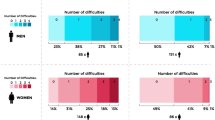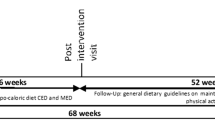Abstract
OBJECTIVE: A widely held clinical belief is that individuals with binge eating problems fare poorly in weight loss programs. The empirical evidence regarding the prognostic significance of binge eating, however, is mixed. The goals of this study were to examine psychological and behavioral characteristics associated with binge eating and the prognostic significance of binge eating for short- and long-term weight loss in a large sample of women treated for obesity.
DESIGN: The dataset used in the current study was a combined sample of women (n=444) who participated in one of three behavioral weight loss research studies.
MATERIALS AND METHOD: Measures of dieting and weight history were obtained at baseline. Body weight, the Binge Eating Scale (BES), a measure of perceived barriers to weight loss, the Beck Depression Inventory, the Block Food Frequency Questionnaire, and the Paffenbarger Physical Activity Questionnaire were assessed at baseline, 6 months and 18 months. Regression analyses examined cross-sectional associations between the BES and the other variables at baseline, prospective associations between baseline BES and changes in weight and the psychological and behavioral variables over time, and temporal covariations between BES and the other variables over time.
RESULTS: Cross-sectional analyses showed baseline binge eating status to be strongly associated with dieting history, weight cycling, depressive symptomatology and perceived barriers to weight loss. Women with binge eating problems were also more likely to drop out of treatment. Baseline binge status was not associated with 6-month weight loss, but was weakly predictive of less weight loss success at 18 months. Binge status at baseline did not predict changes in dietary intake, physical activity, perceived barriers to weight loss or depressive symptomatology at either 6 months or 18 months. In time-dependent covariance analyses, changes in BES scores were significantly associated with changes in body weight, independent of changes in dietary intake and physical activity. However, when depression scores are included in the analysis, the association between binge score and body weight was no longer statistically significant.
CONCLUSION: These findings suggest that baseline binge status was a weak prognostic indicator of success in women who are moderately obese and are seeking treatment for weight loss. Although assessments of binge status covary with weight loss and regain, the relationship appears to be mediated by psychological dysphoria.
This is a preview of subscription content, access via your institution
Access options
Subscribe to this journal
Receive 12 print issues and online access
$259.00 per year
only $21.58 per issue
Buy this article
- Purchase on Springer Link
- Instant access to full article PDF
Prices may be subject to local taxes which are calculated during checkout
Similar content being viewed by others
Author information
Authors and Affiliations
Rights and permissions
About this article
Cite this article
Sherwood, N., Jeffery, R. & Wing, R. Binge status as a predictor of weight loss treatment outcome. Int J Obes 23, 485–493 (1999). https://doi.org/10.1038/sj.ijo.0800846
Received:
Revised:
Accepted:
Published:
Issue Date:
DOI: https://doi.org/10.1038/sj.ijo.0800846
Keywords
This article is cited by
-
Psychometric proprieties of the Italian version of the questionnaire on eating and weight patterns (QEWP-5) and its accuracy in screening for binge-eating disorder in patients seeking treatment for obesity
Eating and Weight Disorders - Studies on Anorexia, Bulimia and Obesity (2020)
-
Eating behaviors and weight loss outcomes in a 12-month randomized trial of diet and/or exercise intervention in postmenopausal women
International Journal of Behavioral Nutrition and Physical Activity (2019)
-
Aerobic exercise training improves physical performance of patients with binge-eating disorder
Sport Sciences for Health (2018)
-
A path model analysis on predictors of dropout (at 6 and 12 months) during the weight loss interventions in endocrinology outpatient division
Endocrine (2018)
-
Mindfulness-Based Eating Awareness Training (MB-EAT) for Binge Eating: A Randomized Clinical Trial
Mindfulness (2014)



